i'm a hopeful romantic longing to seizuring every chance of possible romantic encounters only found, mostly, in romantic comedies genre.
i'm a hopeful romantic who always looks forward to a little bit of quality time in romancing the loved one.
i'm a hopeful romantic whose existence is defined by executing well-planned surprises for the object of my affection.
i'm in love, actually.
i am.
Just in time you’ve found me just in time
Before you came my time was running low
I was lost the losing dice were tossed
My bridges all were crossed nowhere to go
Now you hear now I know just where I’m going
No more doubt of fear I’ve found my way
(and julie delpy starts doing her grooves)
For love came just in time you’ve found me just in time
And changed my lonely nights that lucky day
Just in time
(so, do you think ethan hawke will stay?)
Before you came my time was running low oh baby
I was lost the losing dice were tossed
My bridges all crossed nowhere to go
Now you hear now I know just where I’m going
No more doubt of fear I’ve found my way
For love came just in time you’ve found me just in time
And changed my lonely nights and changed my lonely nights
And changed my lonely nights and changed my lonely nights
And changed my lonely nights that lucky day
(and nina simone gave her utmost)
Jul 24, 2005
Jul 20, 2005
Crash
Such a sensitive issue like racial slurs, when brought up to the artistic form of visual dimension whereby the words and acts dealing with the issue can be seen and examined with our perfunctory senses, may tend to be banal if being given an inconsiderable treatment that shies away from presenting reality.
Thankfully, the banality in this film is in fact the strongest point that makes the film compelling to watch. In a rare occasion of successful ensemble of too many good actors pulling out dramatic punches at their best, Paul Haggis manages to unite them in one strong story of a life in everyday LA, seemingly a town full of racism to inhale as a daily staple.
In the recent times of politeness in tackling the issue, any forms of accusations in the manner of cursing and swearing are easily uttered to one another, at some point taken as jokes, yet most of the time, it has emerged to become some kind of state of mind. The hidden anger and the confusion of misunderstandings beguile these people in living their life blanketed under the cover of assumption and preconceived notions, resulting of exclusivity among their own races.
Life may turn laughing at us or with us, but like the life itself, Crash pulls out an eventful day of any city on the earth where we are taken to realize, how we may never be able to understand the difference. Acknowledging the variety may be one small step to begin.
There are over-paranoid white upper class couple, black detective and his Latino partner, a Hispanic low class family, a struggling Arabic enterpreneurs trying to make a living in this chaotic city filled with compromises and consequences of every racial thoughts that translate to their action. The juxtaposition of these characters' actions may leave you shocked on how looks can be deceiving. Appearances can not be taken for their face-values, especially not in the time of gun-culture when anyone at any given time may shield themselves by pointing guns at any other human beings for any reason under the name of protection.
It may be a fictional place to see, yet the facial expressions of these people tell anguishes some of us have to bear everyday. Others may put it as "c'est la vie", but to me, Crash shows that in a place where angels flock in, the paradise is far ahead to reach.
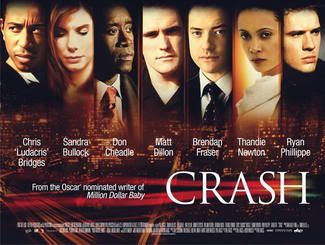
Thankfully, the banality in this film is in fact the strongest point that makes the film compelling to watch. In a rare occasion of successful ensemble of too many good actors pulling out dramatic punches at their best, Paul Haggis manages to unite them in one strong story of a life in everyday LA, seemingly a town full of racism to inhale as a daily staple.
In the recent times of politeness in tackling the issue, any forms of accusations in the manner of cursing and swearing are easily uttered to one another, at some point taken as jokes, yet most of the time, it has emerged to become some kind of state of mind. The hidden anger and the confusion of misunderstandings beguile these people in living their life blanketed under the cover of assumption and preconceived notions, resulting of exclusivity among their own races.
Life may turn laughing at us or with us, but like the life itself, Crash pulls out an eventful day of any city on the earth where we are taken to realize, how we may never be able to understand the difference. Acknowledging the variety may be one small step to begin.
There are over-paranoid white upper class couple, black detective and his Latino partner, a Hispanic low class family, a struggling Arabic enterpreneurs trying to make a living in this chaotic city filled with compromises and consequences of every racial thoughts that translate to their action. The juxtaposition of these characters' actions may leave you shocked on how looks can be deceiving. Appearances can not be taken for their face-values, especially not in the time of gun-culture when anyone at any given time may shield themselves by pointing guns at any other human beings for any reason under the name of protection.
It may be a fictional place to see, yet the facial expressions of these people tell anguishes some of us have to bear everyday. Others may put it as "c'est la vie", but to me, Crash shows that in a place where angels flock in, the paradise is far ahead to reach.

Jul 17, 2005
one season.
there we were,
bidding goodbyes,
waving hands,
and be a faithful doer
of living differently
of loving each other completely
of liking some objects contrastly
under one unity
that when it begins to wear thin
no, it never fades away
instead it remains like it has always been
and gratefully does not even date by a single day
gone maybe those tacky lines
the past bears irreconcilable stupefying minds
and yet there's always something to look forward to
within a month or two
or more than what regulars might think in their contrived thoughts
there we will be,
another bids,
another waves,
another miss-you glee,
another time.
again.
bidding goodbyes,
waving hands,
and be a faithful doer
of living differently
of loving each other completely
of liking some objects contrastly
under one unity
that when it begins to wear thin
no, it never fades away
instead it remains like it has always been
and gratefully does not even date by a single day
gone maybe those tacky lines
the past bears irreconcilable stupefying minds
and yet there's always something to look forward to
within a month or two
or more than what regulars might think in their contrived thoughts
there we will be,
another bids,
another waves,
another miss-you glee,
another time.
again.
Jul 15, 2005
just some blabbering :)
Beberapa hari yang lalu, gue denger dialog ini:
Nyokap si cowok : “Lha iya, enaknya mo gimana ini, udah tinggal besok disini.”
Bokap si cowok : “Yo wis tho, hari ini dipuas-puasin jalan-jalannya”
Cewek : “Iya nih tante, liat aja deh, besok si X bakal diem-diem nangis ditinggal mamanya. Dah gede gini masih gembeng oom, tapi ga mau keliatan nangis. Kangen ama mamanya ntar” (ke cowok) “Jangan nangis ya, sayang …”
Dan walaupun gue ngga menyaksikan langsung ekspresi mereka, tapi yang gue pengen tau adalah gimana perasaan orang tua si cowok, terutama sang nyokap, yang harus ketinggalan berbagai perubahan dalam hidup anaknya, dan tinggal menyaksikan hasil jadi dari perubahan itu. Berubah, karena mungkin sang nyokap ngeliat betapa perhatiannya si pacar terhadap putranya itu, kaya udah ada yang ngurusin hidupnya sekarang, dan itu bukan tugas si nyokap lagi. Berubah ‘kan?
Bingung? Kenapa musti bingung?
Sebenernya emang bukan hal yang aneh waktu begitu kita lepas dari SMA/SMU, sebagian dari kita udah mulai kuliah di luar kota atau luar negeri, yang berarti belajar idup sendiri dengan cara ngekos ato ngontrak tempat tinggal. Nah, disaat pisah dari orang tua inilah benernya kita mulai ngebangun diri kita sendiri mulai dari awal lagi. Apa-apa aja yang dulu pernah kita kerjain sebelum tinggal sendiri, memang ga bakal pernah ilang, lha wong kesimpen di memori otak. Some say our childhood memories will serve as a platform for our adulthood upbringing. As much as this statement is open to argument, I’d still take it as something in grey are requiring more scientific evidence strong enough to validate this. Lha wong pas jaman SMA aja udah banyak yang ngecap gue bi-goss, sekarang … errrr … koq gue menjebak diri gue sendiri sih! :D
Anyway, yang gue pengen tau disini adalah seberapa siap sih orangtua ngelepas anaknya ke ‘kehidupan lain’, ato mungkin ke kehidupan masa depan anak itu sendiri?
Terus terang aja gue belum bisa jawab pertanyaan ini karena belum ada satupun saudara kandung gue yang menikah, jadi gue belum bisa ngeliat gimana reaksi ekspresi orang tua gue ketika harus ngelepas salah satu dari kita untuk menjadi pasangan hidup orang lain. Sialnya lagi, sudah sekitar 6 tahun terakhir ini, gue ngga pernah dateng acara kawinan satu pun! Percaya ga percaya, gue belum pernah dateng satu pun kawinan temen SMA gue, huhuhuhuh … Kalo kalian baca ini, maafkanlah, dan … Salam Mitreka! :D
Begitu juga dengan kawinan sodara-sodara sendiri, ga pernah ada yang gue datengin selama lebih dari separo dekade ini, jadi memori tentang reaksi para oom dan tante gue sebatas apa yang gue inget sampe jaman SMA dulu.
Sebagian besar dari para oom dan tante yang notabene adalah para orangtua dari sodara sepupu gue itu bersikap biasa aja, pasrah, dan menerima anak mereka ngejalanin hidup dengan pacar mereka yang naik status sebagai suami/istri itu sebagai bagian dari perjalanan hidup. Seperti layaknya juga dengan apa yang terjadi setelah pernikahan, be it giving birth to their children, perceraian, kawin lagi, kematian, and many other catastrophes.
Mungkin ada sedikit perasaan berat yang ga pernah keungkap. Mungkin ada sedikit konflik, lahir ato batin, yang terjadi sebelum proses serah terima itu (emang lagi jual rumah bo?!). Dan mungkin karena udah begitu pasrahnya, jadi nrimo aja dengan segala hal yang udah berubah dalam hidup.
Life is a rollercoaster ride, it ain’t fun if it ain’t change from up to down, forming a full circle.
Dan seperti biasa, tulisan tak berujung tak berpangkal ini cuman sedikit ngomongin ketakjuban gue ama the changing of us. Itu aja koq ;)
Nyokap si cowok : “Lha iya, enaknya mo gimana ini, udah tinggal besok disini.”
Bokap si cowok : “Yo wis tho, hari ini dipuas-puasin jalan-jalannya”
Cewek : “Iya nih tante, liat aja deh, besok si X bakal diem-diem nangis ditinggal mamanya. Dah gede gini masih gembeng oom, tapi ga mau keliatan nangis. Kangen ama mamanya ntar” (ke cowok) “Jangan nangis ya, sayang …”
Dan walaupun gue ngga menyaksikan langsung ekspresi mereka, tapi yang gue pengen tau adalah gimana perasaan orang tua si cowok, terutama sang nyokap, yang harus ketinggalan berbagai perubahan dalam hidup anaknya, dan tinggal menyaksikan hasil jadi dari perubahan itu. Berubah, karena mungkin sang nyokap ngeliat betapa perhatiannya si pacar terhadap putranya itu, kaya udah ada yang ngurusin hidupnya sekarang, dan itu bukan tugas si nyokap lagi. Berubah ‘kan?
Bingung? Kenapa musti bingung?
Sebenernya emang bukan hal yang aneh waktu begitu kita lepas dari SMA/SMU, sebagian dari kita udah mulai kuliah di luar kota atau luar negeri, yang berarti belajar idup sendiri dengan cara ngekos ato ngontrak tempat tinggal. Nah, disaat pisah dari orang tua inilah benernya kita mulai ngebangun diri kita sendiri mulai dari awal lagi. Apa-apa aja yang dulu pernah kita kerjain sebelum tinggal sendiri, memang ga bakal pernah ilang, lha wong kesimpen di memori otak. Some say our childhood memories will serve as a platform for our adulthood upbringing. As much as this statement is open to argument, I’d still take it as something in grey are requiring more scientific evidence strong enough to validate this. Lha wong pas jaman SMA aja udah banyak yang ngecap gue bi-goss, sekarang … errrr … koq gue menjebak diri gue sendiri sih! :D
Anyway, yang gue pengen tau disini adalah seberapa siap sih orangtua ngelepas anaknya ke ‘kehidupan lain’, ato mungkin ke kehidupan masa depan anak itu sendiri?
Terus terang aja gue belum bisa jawab pertanyaan ini karena belum ada satupun saudara kandung gue yang menikah, jadi gue belum bisa ngeliat gimana reaksi ekspresi orang tua gue ketika harus ngelepas salah satu dari kita untuk menjadi pasangan hidup orang lain. Sialnya lagi, sudah sekitar 6 tahun terakhir ini, gue ngga pernah dateng acara kawinan satu pun! Percaya ga percaya, gue belum pernah dateng satu pun kawinan temen SMA gue, huhuhuhuh … Kalo kalian baca ini, maafkanlah, dan … Salam Mitreka! :D
Begitu juga dengan kawinan sodara-sodara sendiri, ga pernah ada yang gue datengin selama lebih dari separo dekade ini, jadi memori tentang reaksi para oom dan tante gue sebatas apa yang gue inget sampe jaman SMA dulu.
Sebagian besar dari para oom dan tante yang notabene adalah para orangtua dari sodara sepupu gue itu bersikap biasa aja, pasrah, dan menerima anak mereka ngejalanin hidup dengan pacar mereka yang naik status sebagai suami/istri itu sebagai bagian dari perjalanan hidup. Seperti layaknya juga dengan apa yang terjadi setelah pernikahan, be it giving birth to their children, perceraian, kawin lagi, kematian, and many other catastrophes.
Mungkin ada sedikit perasaan berat yang ga pernah keungkap. Mungkin ada sedikit konflik, lahir ato batin, yang terjadi sebelum proses serah terima itu (emang lagi jual rumah bo?!). Dan mungkin karena udah begitu pasrahnya, jadi nrimo aja dengan segala hal yang udah berubah dalam hidup.
Life is a rollercoaster ride, it ain’t fun if it ain’t change from up to down, forming a full circle.
Dan seperti biasa, tulisan tak berujung tak berpangkal ini cuman sedikit ngomongin ketakjuban gue ama the changing of us. Itu aja koq ;)
Jul 11, 2005
in-between
if home is a place where we can’t be honest to ourselves,
if a comfort zone is a place where we can’t escape the scrutiny of being pressurized,
if home is a place where to be bold means sacrificing our comfort,
if a comfort zone is a place where to be free has to miss our home,
if home is merely a state of mind,
if a comfort zone is merely man-made creation,
where do we stand then?
if a comfort zone is a place where we can’t escape the scrutiny of being pressurized,
if home is a place where to be bold means sacrificing our comfort,
if a comfort zone is a place where to be free has to miss our home,
if home is merely a state of mind,
if a comfort zone is merely man-made creation,
where do we stand then?
Jul 5, 2005
War of the Worlds
Love him. Hate him. Adore him. Dismiss him. Indifferent? Neutral?
The two latter words have never arisen to surface when we start talking about this dream-maker who goes by the name of Steven Spielberg. At least, not until we watch his latest work, War of the Worlds.

The reason for those first words is quite clear: those who praise him tend to faithfully worship him regardless of his misfires on Amistad or The Lost World for example, whereas for those who bash him out will suppress their feelings on marvel works a la The Color Purple or Raiders of the Lost Ark. Hardly we think “it’s good, but …” or “it should’ve been this or that, then it’ll be good or bad” since Spielberg presents his work as representation of his own dream, his own fantasy world he longs to exist in reality. Not quite an auteur though, but there is a certain visual element on each of his work, often superbly crafted that will leave us feeling mesmerized. The bleak look of World War II is captured convincingly through the lens of Janusz Kaminski in Schindler’s List, the swinging 60’s has never looked any brighter in Catch Me If You Can, and the marriage of high-technology concept and futuristic look reaches its highest point in Minority Report. Regardless my disliking towards the latter film, the look itself is enough to keep me glued to the seat and getting overblown by his magic. This is something lacking on his second collaboration with perfectly miscast Tom Cruise here.
Or at least inconsistencies keep occurring throughout the film. I jumped off my seat while reeling the glowing looks surrounding Miranda Otto and David Alan Basche, suggesting the dreamy-like surrounding in the scene. A good five-to-ten seconds there, only to be ruined with the monotonous grayish coloring throughout early scenes, with certain gap of stillness in-between the scenes. Call me being unknowledgeable on examining Spielberg’s films but I can’t help scratching my head over things you least expect from a Spielberg film. Not to mention other kind of inconsistencies in logicality of the story that will leave smiles on the faces of trivia and goofs spotter out there, and failure to bring out the best in Tim Robbins and surprisingly annoying Dakota Fanning.
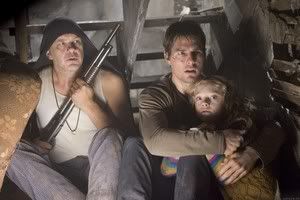
Does he want a breakthrough? Artificial Intelligence does better than that. It may be a tribute to Stanley Kubrick, but Spielberg does inject his personal touch that makes the film adorable despite its semi-controversial subject. Spielberg’s films stand for his own testament on how to amuse audience in genres crossing over one another, that we often think no other directors can make or re-create Spielberg’s films. Sadly, when I set my eyes to the big screen in Lido Theatre watching Tom Cruise trying too hard to act appropriately to his character, I can’t help wondering that this film should have been directed by someone else, to make it better.
The moment of revelation? Morgan Freeman’s majestic voice over.
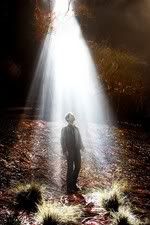
The two latter words have never arisen to surface when we start talking about this dream-maker who goes by the name of Steven Spielberg. At least, not until we watch his latest work, War of the Worlds.

The reason for those first words is quite clear: those who praise him tend to faithfully worship him regardless of his misfires on Amistad or The Lost World for example, whereas for those who bash him out will suppress their feelings on marvel works a la The Color Purple or Raiders of the Lost Ark. Hardly we think “it’s good, but …” or “it should’ve been this or that, then it’ll be good or bad” since Spielberg presents his work as representation of his own dream, his own fantasy world he longs to exist in reality. Not quite an auteur though, but there is a certain visual element on each of his work, often superbly crafted that will leave us feeling mesmerized. The bleak look of World War II is captured convincingly through the lens of Janusz Kaminski in Schindler’s List, the swinging 60’s has never looked any brighter in Catch Me If You Can, and the marriage of high-technology concept and futuristic look reaches its highest point in Minority Report. Regardless my disliking towards the latter film, the look itself is enough to keep me glued to the seat and getting overblown by his magic. This is something lacking on his second collaboration with perfectly miscast Tom Cruise here.
Or at least inconsistencies keep occurring throughout the film. I jumped off my seat while reeling the glowing looks surrounding Miranda Otto and David Alan Basche, suggesting the dreamy-like surrounding in the scene. A good five-to-ten seconds there, only to be ruined with the monotonous grayish coloring throughout early scenes, with certain gap of stillness in-between the scenes. Call me being unknowledgeable on examining Spielberg’s films but I can’t help scratching my head over things you least expect from a Spielberg film. Not to mention other kind of inconsistencies in logicality of the story that will leave smiles on the faces of trivia and goofs spotter out there, and failure to bring out the best in Tim Robbins and surprisingly annoying Dakota Fanning.

Does he want a breakthrough? Artificial Intelligence does better than that. It may be a tribute to Stanley Kubrick, but Spielberg does inject his personal touch that makes the film adorable despite its semi-controversial subject. Spielberg’s films stand for his own testament on how to amuse audience in genres crossing over one another, that we often think no other directors can make or re-create Spielberg’s films. Sadly, when I set my eyes to the big screen in Lido Theatre watching Tom Cruise trying too hard to act appropriately to his character, I can’t help wondering that this film should have been directed by someone else, to make it better.
The moment of revelation? Morgan Freeman’s majestic voice over.

Jul 3, 2005
Swan Lake
The United Kingdom’s prestigious The Royal Ballet Company presented everything that rings true in treating a timeless tale as legendary as Swan Lake: it needs to be royally grand in terms of staging, it needs to be emotionally engaging to keep audience seated for 165 minutes, and it needs to be magical to make audience keep humming Tchaikovsky’s delicately crafted tunes long after the show ends. Such impossible tasks were embarked effortlessly by the 90-strong troupe highly respected as one of the most sought-after ballet companies in the world. Staged as part of Singapore Arts Festival 2005, it was hardly any surprise to find most of tickets had been snapped up months earlier leading to the three-night only presentation.
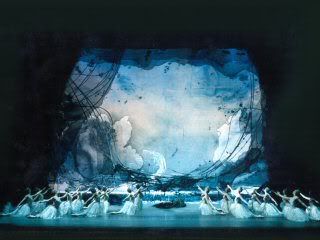
On Friday night, 24 June 2005, the 2,000-seats of Esplanade Theatre, Singapore, became a witness of dazzling spectacle set in the late 19th-century Russia, where a prince by the name of Siegfried is having a coming-of-age party, and the eventful occasion turns to be a more delightful one when he encounters a flock of swans, and decidedly ends the festivities with a hunt on a deserted lakeside by ruins of a chapel. Little does he know that the lake is an enchanted place where the Swan Princess Odette lives together with her fellow victims of Von Rothbart, an evil magician who turns them into swans by day, yet they can return to the form of human beings by night. The lake itself is a lake of tears shed by Odette’s mother over the suffering of her daughter’s fated destiny. However, this cursed spell can be broken only when someone who has never loved before, will pledge and sacrifice his eternity to Odette.
Knowing that Siegfried will take more than anything to rescue and prove his love to Odette, Von Rothbart does a dirty trick by transforming his own daughter, Odile, into bearing a similar physical resemblance to Odette. The prince dances with Odile, whom he mistakenly assumes as Odette, at the kingdom’s ball, and captivated by her beauty, he proposes to her in front of the royal court. When the royal family accepts his initiative, Von Rothbart begins to reveal the truest layer of his plan, leaving Siegfried disappointed and hurrying down to the lake in search of Odette.
Hearing the heart-wrenching news, the real Odette decides to face death by perishing herself in the waves of the lake, so as to free herself from the evil power. Siegfried pursues Odette there, while Von Rothbart who insists him on marrying Odile threatens him. Not wanting to leave Odette being a swan forever if he marries Odile, Siegfried decides to be united with Odette in death. Von Rothbart and his power fall, the swan maidens are freed and the lake will linger in memory as a witness of star crossed lovers.
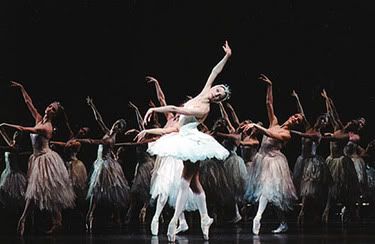
Under the guidance of conductor Valery Ovsyanikov with the strong support from Shanghai Philharmonic Orchestra, the audience was transported to the fantasy world divided in four equally elegant acts: Act I on the initial party celebrating Prince Siegfried’s coming of age, Act II lays the lake where the swans flock to the spotlight, Act III presents the dazzling colors of costume ball, and the final act IV revolves around the lake to resolute the lovers’ destiny. These acts are conceived and brought to the audience eloquently in enviable stage and costume designs meticulously conceptualized and gorgeously presented in Faberge inspired style by the designer Yolanda Sonnabend, as if to enhance the truest quality the ballet company has in store to bring the tale lively on a grand scale performance. The bare proscenium arch stage of Esplanade Theatre could not be more fitting to accommodate the extravaganza set which draws disbelief sighs often heard among audience in seeing how the stage is imbued within the ballerinas’ elastic movements that deserve numerous applause throughout the show. Whereas it may be impossible to place a certain divided notion among each and every dancer performed on the night, it is inevitable not to praise Roberta Marquez and Johan Kobborg, as Odette/Odile and Prince Siegfried respectively, in carrying their roles with graceful and irresistible presence.
For sure, the troupe has done a testament that will leave Marius Petipa, the initial choreographer, feeling proud of the work he had started more than nine decades ago.
The timeless beauty will remain eternally beauty as it is meant to be.

On Friday night, 24 June 2005, the 2,000-seats of Esplanade Theatre, Singapore, became a witness of dazzling spectacle set in the late 19th-century Russia, where a prince by the name of Siegfried is having a coming-of-age party, and the eventful occasion turns to be a more delightful one when he encounters a flock of swans, and decidedly ends the festivities with a hunt on a deserted lakeside by ruins of a chapel. Little does he know that the lake is an enchanted place where the Swan Princess Odette lives together with her fellow victims of Von Rothbart, an evil magician who turns them into swans by day, yet they can return to the form of human beings by night. The lake itself is a lake of tears shed by Odette’s mother over the suffering of her daughter’s fated destiny. However, this cursed spell can be broken only when someone who has never loved before, will pledge and sacrifice his eternity to Odette.
Knowing that Siegfried will take more than anything to rescue and prove his love to Odette, Von Rothbart does a dirty trick by transforming his own daughter, Odile, into bearing a similar physical resemblance to Odette. The prince dances with Odile, whom he mistakenly assumes as Odette, at the kingdom’s ball, and captivated by her beauty, he proposes to her in front of the royal court. When the royal family accepts his initiative, Von Rothbart begins to reveal the truest layer of his plan, leaving Siegfried disappointed and hurrying down to the lake in search of Odette.
Hearing the heart-wrenching news, the real Odette decides to face death by perishing herself in the waves of the lake, so as to free herself from the evil power. Siegfried pursues Odette there, while Von Rothbart who insists him on marrying Odile threatens him. Not wanting to leave Odette being a swan forever if he marries Odile, Siegfried decides to be united with Odette in death. Von Rothbart and his power fall, the swan maidens are freed and the lake will linger in memory as a witness of star crossed lovers.

Under the guidance of conductor Valery Ovsyanikov with the strong support from Shanghai Philharmonic Orchestra, the audience was transported to the fantasy world divided in four equally elegant acts: Act I on the initial party celebrating Prince Siegfried’s coming of age, Act II lays the lake where the swans flock to the spotlight, Act III presents the dazzling colors of costume ball, and the final act IV revolves around the lake to resolute the lovers’ destiny. These acts are conceived and brought to the audience eloquently in enviable stage and costume designs meticulously conceptualized and gorgeously presented in Faberge inspired style by the designer Yolanda Sonnabend, as if to enhance the truest quality the ballet company has in store to bring the tale lively on a grand scale performance. The bare proscenium arch stage of Esplanade Theatre could not be more fitting to accommodate the extravaganza set which draws disbelief sighs often heard among audience in seeing how the stage is imbued within the ballerinas’ elastic movements that deserve numerous applause throughout the show. Whereas it may be impossible to place a certain divided notion among each and every dancer performed on the night, it is inevitable not to praise Roberta Marquez and Johan Kobborg, as Odette/Odile and Prince Siegfried respectively, in carrying their roles with graceful and irresistible presence.
For sure, the troupe has done a testament that will leave Marius Petipa, the initial choreographer, feeling proud of the work he had started more than nine decades ago.
The timeless beauty will remain eternally beauty as it is meant to be.
Jul 1, 2005
Walk on Water
Next time we catch a film on a cinema, be sure not to arrive late to *properly* notice the opening credits of the film. There may be a hint shown during the opening credit that will give us a little clue on how the film we are about to watch is going to turn out. It does not mean to set a certain expectations or whatsoever, yet the attention will serve as some kind of guidance on how to watch the film in a certain fashion. Especially if the film has a drop of governmental influence.
When I saw the words of "Israeli Film Fund" at the beginning of the film, I had no objections whether this film has to be politically correct. After all, it does not take powerful political injection to make Kingdom of Heaven behaves like a lion on sedative medication. Or the recently released In My Father's Den still manages to generate a good buzz on its emotionally appealing plot twists, without anyone ever remember that the film is funded by New Zealand authorities to boost the country's film development.
Hidden agendas are hard to escape. By any means, film makers will feel reluctant to go extremes in being arrogant as they have this amount of accommodativeness. The government institutions help them financing the film, the filmmakers will try their best, or do a little sacrifice in accommodating messages or laws or any form of apprehensive information to be inserted to the film. Yet when they integrate to the tight-lined structure of the film, they succeed to disappear and pave the way of total enjoyment in watching a film on a big screen. At least, the subtlety of such placement will not make us raging over 2-second show-off a la Tisot watch in Angelina Jolie's wrist.
What's wrong with Walk on Water then?
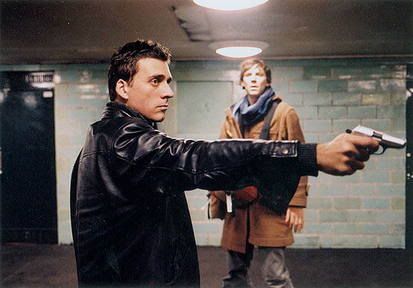
To me, nothing.
But a fellow film enthusiast point out how the film was made to look like a PA-commercial of Israeli and Germany tourism promotion. The panoramic views of Israeli like we've never seen in any primetime news before may enhance this opinion, which IMHO is something acceptable to do since, going back to my point above, the film is funded by government and it serves the storyline. Consider the summary below.
Eyal, an Israeli spy agent, on the heels of despair after his wife committed suicide, is given a mission to murder an ex-criminal of war in Germany. To get in touch with the family member, he pretends to be a tourist guide who will accompany the convicted's grandson, Axel, in his holiday trip to Israel to visit his sister. What starts off as a pure business relationship blossoms to become a close friendhsip, eventhough Axel's outgoing personality clashes with Eyal's introvertness, not to mention Axel's homosexuality which frights Eyal's orthodox value at first. As Axel finishes the holiday, and the mission drags to uncertainties, the agency decides to send Eyal to Germany to finish the mission.
The two buddies meet again, and Eyal succeeds in getting an invitation the Axel's family gathering where the secrets of more than five-decade year old are revealed.
Interchanging scenes that shift between two countries greatly different from one another allow Eytan Fox helming the film in such a way to suggest the film being ripped off directly from pictorial books. Together with the cinematographer Tobias Hochstein, they present the two countries as an ideal place to live in. From the houses with communal atmosphere in Israeli suburban area where they look peaceful, to the bright lights of Frankfurt, they put distinctive quality to each set that eventually do not merely serve as backdrop, but rather, in accordance with each personality traits that the character posses.
Well, to expand further on the latter statement may take up our whole patience here as I can feel that you start to get tiresome reading this blurting, but what I can assure you is that it may be tempting to classify the characters into stereotype or classification of being Arian and Jewish as what our pre-conceived notion might bring. After all, the two good-looking lead actors carry physical qualities of their own race in the first place.
Yet, in this political-charged drama, we may not see many mind-challenging twist. Everything is told in a clean slate narrative manner, flows on a chronological order of time without any dizzying flashback scenes as they are promptly inserted in the dialogues. But to see an enjoyable drama with nuanced performances from the actors in a big screen is surely one pleasant way to spend a Saturday evening.
Not to mention that it will make us feeling like taking a walk in a breezy sea of Israel.
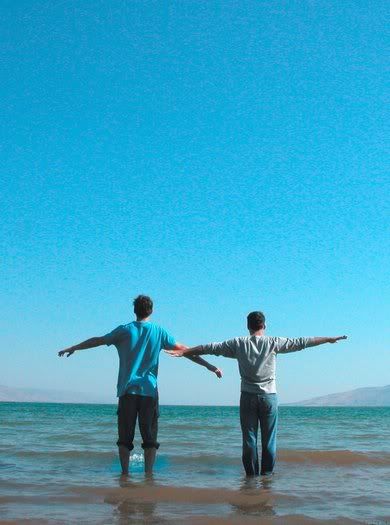
When I saw the words of "Israeli Film Fund" at the beginning of the film, I had no objections whether this film has to be politically correct. After all, it does not take powerful political injection to make Kingdom of Heaven behaves like a lion on sedative medication. Or the recently released In My Father's Den still manages to generate a good buzz on its emotionally appealing plot twists, without anyone ever remember that the film is funded by New Zealand authorities to boost the country's film development.
Hidden agendas are hard to escape. By any means, film makers will feel reluctant to go extremes in being arrogant as they have this amount of accommodativeness. The government institutions help them financing the film, the filmmakers will try their best, or do a little sacrifice in accommodating messages or laws or any form of apprehensive information to be inserted to the film. Yet when they integrate to the tight-lined structure of the film, they succeed to disappear and pave the way of total enjoyment in watching a film on a big screen. At least, the subtlety of such placement will not make us raging over 2-second show-off a la Tisot watch in Angelina Jolie's wrist.
What's wrong with Walk on Water then?

To me, nothing.
But a fellow film enthusiast point out how the film was made to look like a PA-commercial of Israeli and Germany tourism promotion. The panoramic views of Israeli like we've never seen in any primetime news before may enhance this opinion, which IMHO is something acceptable to do since, going back to my point above, the film is funded by government and it serves the storyline. Consider the summary below.
Eyal, an Israeli spy agent, on the heels of despair after his wife committed suicide, is given a mission to murder an ex-criminal of war in Germany. To get in touch with the family member, he pretends to be a tourist guide who will accompany the convicted's grandson, Axel, in his holiday trip to Israel to visit his sister. What starts off as a pure business relationship blossoms to become a close friendhsip, eventhough Axel's outgoing personality clashes with Eyal's introvertness, not to mention Axel's homosexuality which frights Eyal's orthodox value at first. As Axel finishes the holiday, and the mission drags to uncertainties, the agency decides to send Eyal to Germany to finish the mission.
The two buddies meet again, and Eyal succeeds in getting an invitation the Axel's family gathering where the secrets of more than five-decade year old are revealed.
Interchanging scenes that shift between two countries greatly different from one another allow Eytan Fox helming the film in such a way to suggest the film being ripped off directly from pictorial books. Together with the cinematographer Tobias Hochstein, they present the two countries as an ideal place to live in. From the houses with communal atmosphere in Israeli suburban area where they look peaceful, to the bright lights of Frankfurt, they put distinctive quality to each set that eventually do not merely serve as backdrop, but rather, in accordance with each personality traits that the character posses.
Well, to expand further on the latter statement may take up our whole patience here as I can feel that you start to get tiresome reading this blurting, but what I can assure you is that it may be tempting to classify the characters into stereotype or classification of being Arian and Jewish as what our pre-conceived notion might bring. After all, the two good-looking lead actors carry physical qualities of their own race in the first place.
Yet, in this political-charged drama, we may not see many mind-challenging twist. Everything is told in a clean slate narrative manner, flows on a chronological order of time without any dizzying flashback scenes as they are promptly inserted in the dialogues. But to see an enjoyable drama with nuanced performances from the actors in a big screen is surely one pleasant way to spend a Saturday evening.
Not to mention that it will make us feeling like taking a walk in a breezy sea of Israel.

Subscribe to:
Comments (Atom)
My Profile

- Nauval Yazid
- Jakarta, Indonesia
- A film festival manager. A writer. An avid moviegoer. An editor. An aspiring culinary fan. A man.